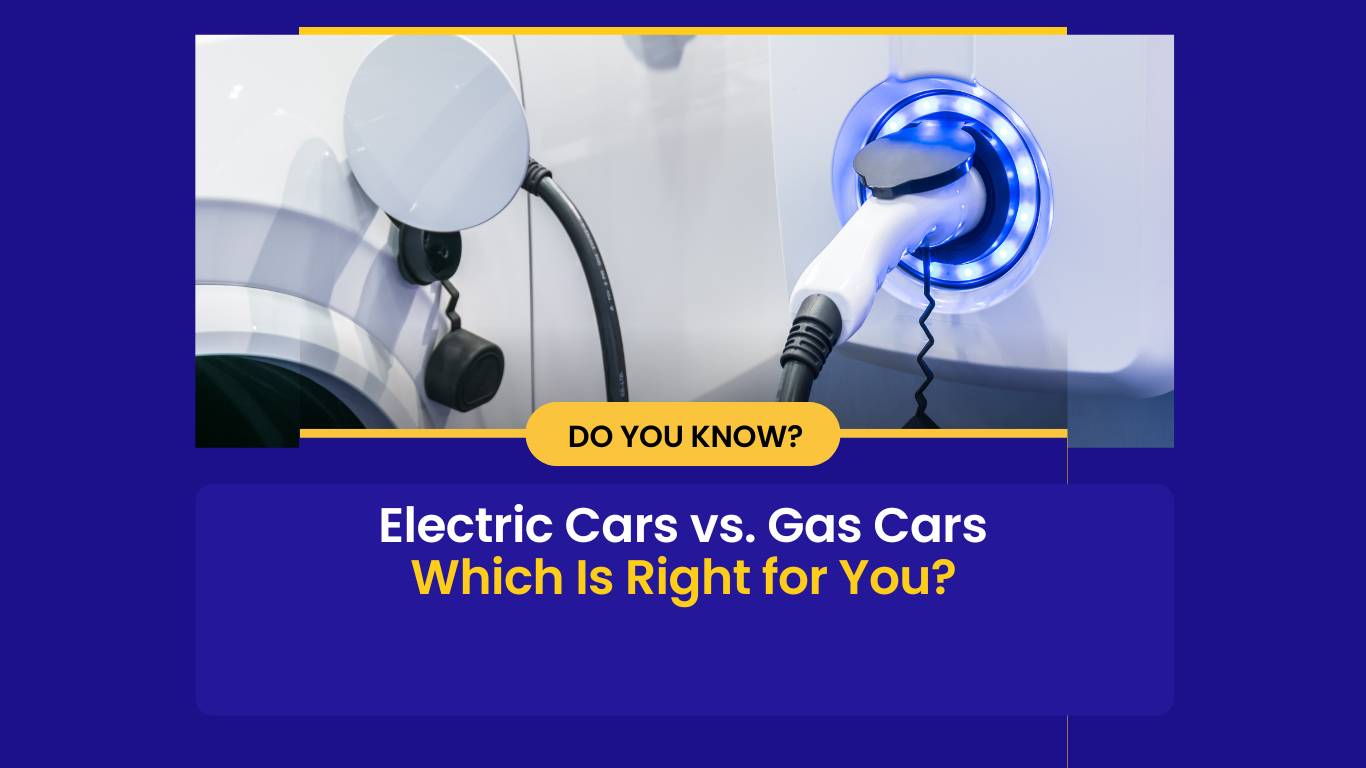In recent years, electric cars have surged in popularity as more people recognize the benefits of embracing cleaner and more sustainable transportation options. Advances in technology, combined with the growing availability of charging infrastructure and government incentives, have made electric vehicles (EVs) more accessible and appealing to a broad range of consumers.
However, when deciding between an electric car and a traditional gas-powered vehicle, it’s crucial to weigh all factors, including environmental impact, cost, performance, convenience, and technological advancements.
Making an informed choice ensures that you select the vehicle that best aligns with your lifestyle, values, and driving needs.
Environmental Impact
Electric Cars: Reduced Emissions and Renewable Energy Sources
One of the most significant advantages of electric cars is their contribution to reducing harmful emissions. Unlike gas-powered vehicles, electric cars do not produce tailpipe emissions, which are a major source of air pollution and greenhouse gases.
This reduction in emissions plays a crucial role in combating climate change and improving air quality, especially in urban areas. Additionally, electric vehicles can be powered by renewable energy sources such as solar, wind, and hydroelectric power.
By harnessing these sustainable energy options, the overall carbon footprint of electric vehicles can be further diminished, making them an environmentally friendly choice for conscientious consumers.
Gas Cars: Carbon Footprint and Fossil Fuel Dependency
Gas cars, on the other hand, are heavily reliant on fossil fuels, which contribute significantly to their overall carbon footprint. The combustion of gasoline and diesel in internal combustion engines releases a substantial amount of carbon dioxide (CO2) and other pollutants into the atmosphere.
These emissions contribute to global warming and have negative effects on air quality, posing health risks to populations worldwide. Additionally, the extraction, refining, and distribution of fossil fuels further exacerbate environmental degradation and contribute to the depletion of natural resources.
Comparison of Long-Term Environmental Effects
When comparing the long-term environmental effects of electric versus gas cars, electric vehicles clearly have the upper hand in terms of reducing emissions and promoting sustainability.
While the production of electric vehicles, particularly their batteries, does have an environmental impact, advancements in manufacturing and recycling technologies are continually mitigating these effects.
In contrast, the environmental damage associated with fossil fuel extraction and combustion remains a significant concern for gas-powered vehicles. As the adoption of electric vehicles increases and renewable energy sources become more widespread, the positive environmental impact of transitioning to electric cars will only continue to grow.
Cost Analysis
Initial Purchase Price: Electric vs. Gas
When evaluating the cost of purchasing a new vehicle, the initial purchase price is a critical factor. Generally, electric cars tend to have a higher upfront cost compared to their gas counterparts. This price disparity is largely due to the cost of advanced battery technology and the innovative features that many electric vehicles offer. However, it’s important to consider the long-term financial benefits of owning an electric car, which can offset the initial expense over time.
Maintenance Costs: Routine Services and Part Replacements
Maintenance costs for electric cars and gas cars differ significantly due to the distinct mechanics of their powertrains. Electric vehicles typically have fewer moving parts in their drivetrains compared to internal combustion engines, which means fewer components are likely to wear out or fail.
Routine services for electric cars often include tire rotations and brake checks rather than oil changes, spark plug replacements, and exhaust system repairs necessary for gas cars. Over the lifespan of the vehicle, the simplified maintenance requirements of electric cars can lead to considerable savings.
Fuel/Energy Costs: Gasoline Prices vs. Electricity Rates
Fuel costs are another important consideration in the cost analysis of electric versus gas cars.
Gasoline prices are subject to market fluctuations, geopolitical factors, and supply chain dynamics, which can lead to unpredictable costs for gas car owners.
In contrast, electricity rates tend to be more stable, and the cost per mile for driving an electric vehicle is usually lower compared to a gas car.
Additionally, many electric vehicle owners have the option to charge their cars at home using renewable energy sources, further reducing their fuel expenses.
Incentives and Tax Breaks: Government Rebates for Electric Cars
Governments around the world are encouraging the adoption of electric vehicles through various incentives and tax breaks. These incentives can significantly reduce the overall cost of purchasing an electric car. For example, federal and state-level programs may offer rebates, tax credits, or reduced registration fees for electric vehicle buyers.
These financial incentives are designed to make electric vehicles more accessible and affordable, further enhancing their appeal as a cost-effective alternative to traditional gas-powered vehicles.
Performance and Range
Electric Cars: Acceleration, Torque, Battery Range
Electric cars are renowned for their impressive acceleration and torque. Due to the nature of electric motors, they can deliver instant torque, resulting in a smooth and rapid acceleration right off the line. This immediate response often translates to a more exhilarating driving experience, making electric vehicles (EVs) popular among enthusiasts. Additionally, advancements in battery technology have significantly improved the range of electric cars.
Many modern EVs can now travel over 200 miles on a single charge, with some premium models pushing well beyond 300 miles. This extended range makes electric cars increasingly viable for daily commutes and longer journeys alike.
Gas Cars: Engine Performance, Fuel Range, Refueling Time
Gas cars have long been celebrated for their robust engine performance and impressive fuel range. Internal combustion engines are capable of delivering high horsepower and torque, providing a thrilling driving experience and strong performance under various conditions.
Gas-powered vehicles also benefit from an extensive network of refueling stations that allow for quick and convenient refueling.
A typical gas car can be refueled in a matter of minutes, giving it a distinct advantage over the longer charging times required for electric cars. Additionally, the fuel range of gas cars can be quite extensive, enabling long-distance travel without the need for frequent stops.
Real-World Usability: Daily Commutes and Long Trips
When considering real-world usability, both electric and gas cars have their own strengths and considerations. Electric cars are well-suited for daily commutes and urban driving, where their quick acceleration, low operating costs, and environmental benefits shine.
For those with access to home charging, the convenience of starting each day with a full battery is undeniable. However, for long trips, the availability of charging infrastructure and longer charging times can pose challenges.
Conversely, gas cars offer seamless refueling and reliable performance, making them an excellent choice for long-distance travel and remote areas where charging stations may be scarce.
Ultimately, the choice between an electric car and a gas car for daily commutes and long trips will depend on individual driving patterns, availability of charging infrastructure, and personal preferences.
Convenience and Infrastructure
Charging Stations vs. Gas Stations: Availability and Accessibility
The availability and accessibility of charging stations and gas stations are crucial considerations for vehicle owners. Gas stations are widespread, with well-established networks providing nearly ubiquitous access. In contrast, the network of charging stations for electric cars is still expanding.
Urban areas and major highways are seeing a rapid increase in charging stations, with dedicated EV charging networks making significant investments. However, rural and less populated areas may still face a shortage of charging points.
As the adoption of electric vehicles grows, charging infrastructure is expected to improve, but currently, gas stations offer a more seamless and immediate refueling experience.
Home Charging Options: Installation, Costs, and Convenience
One of the significant advantages of electric vehicles is the convenience of home charging. Installing a home charging station requires some initial investment, including the cost of the charger and potential upgrades to home electrical systems. However, this setup allows EV owners to charge their vehicles overnight, waking up to a fully charged car each morning.
The costs of home charging are typically lower than public charging stations and significantly lower than gasoline prices. For homeowners, this convenience means less dependence on public charging infrastructure and more control over charging schedules and costs.
Road-trip Viability: Long-Distance Travel and Planning
Long-distance travel with an electric vehicle requires more planning than with a gas car. While advancements in battery technology have extended the range of modern EVs, drivers need to account for the availability of fast charging stations along their routes.
Planning tools and apps that map out charging stations can be very helpful for road trips, ensuring that drivers know where to stop to recharge. Charging times, although improving, can still be longer than a traditional gas refill. On the other hand, gas cars offer quick refueling and an extensive network of fuel stations, making spontaneous long-distance travel more feasible.
Ultimately, while electric vehicles are becoming increasingly viable for road trips, they currently require a bit more forethought and planning compared to their gas-powered counterparts.
Technological Advancements
Electric Cars: Latest Innovations, Advancement in Battery Technology
The electric vehicle sector has witnessed a surge of groundbreaking innovations and advancements in recent years. One of the most transformative developments has been in battery technology. The advent of solid-state batteries, which promise higher energy densities and faster charging times, is set to revolutionize the industry.
These batteries are not only more efficient but also safer, reducing the risk of overheating and increasing longevity. Additionally, the integration of artificial intelligence and machine learning in battery management systems optimizes performance, predicting maintenance needs and optimizing charging cycles.
Wireless charging technology is also making strides, offering the possibility of seamless, cable-free charging experiences shortly. The continuous push towards renewable energy integration further underscores the commitment to a sustainable automotive future.
Gas Cars: Continued Improvements and New Technologies
Despite the rise of electric vehicles, the gas-powered car industry remains committed to innovation. Modern internal combustion engines are becoming more efficient through advancements such as turbocharging and direct fuel injection, which enhance power output while reducing fuel consumption.
Hybrid technologies are also bridging the gap between traditional gas engines and electric motors, offering improved fuel efficiency and lower emissions. Furthermore, the development of synthetic fuels, which are produced using renewable energy sources, presents a promising pathway toward reducing the carbon footprint of gas vehicles.
Advanced driver assistance systems (ADAS) continue to flourish in gas cars, incorporating features like adaptive cruise control, lane-keeping assist, and automated emergency braking to enhance safety and comfort.
Future Prospects: Growth of Electric Vehicle Market, Potential Technological Breakthroughs in Gas Vehicles
The future of the automotive industry looks increasingly electric, with the electric vehicle market poised for exponential growth. Government policies, environmental regulations, and consumer preferences are all driving the transition towards greener transportation.
Predictions suggest that by 2040, electric vehicles could constitute a significant portion of global car sales. As battery costs continue to decrease and charging infrastructure expands, the affordability and accessibility of electric cars will only improve, accelerating their adoption.
However, the potential for technological breakthroughs in gas vehicles cannot be dismissed. Research and development in areas like hydrogen-powered cars and advancements in synthetic fuel technology offer exciting prospects. These innovations may provide alternative solutions for reducing emissions and improving fuel efficiency, ensuring that gas-powered vehicles remain a viable option in a rapidly evolving market.
Ultimately, the future will likely see a diverse automotive landscape where electric and advanced gas vehicles coexist, each playing a crucial role in meeting the world’s transportation needs.
Conclusion
In summary, the automotive industry is undergoing a profound transformation with the growing adoption of electric vehicles (EVs) and continued advancements in gas-powered cars. Electric vehicles offer numerous benefits, including lower operating costs, zero emissions, and the convenience of home charging. However, challenges such as limited charging infrastructure and longer charging times persist, making careful planning essential for long-distance travel.
For potential buyers, the choice between electric and gas vehicles depends on individual needs and lifestyle. If you have access to home charging and mostly drive short to medium distances, an electric vehicle could be a rewarding and eco-friendly option. Gas cars, on the other hand, offer a familiar and reliable driving experience with continued improvements in efficiency and technology.
With both industries continuously pushing boundaries and exploring new technologies, the future of transportation looks exciting and promising. Whether you opt for an electric or gas vehicle, the ultimate goal remains the same – to reduce our carbon footprint and create a more sustainable future for generations to come. So why not join the movement towards greener transportation today? Happy driving!
FAQs
1. Are electric cars more environmentally friendly than gas cars?
Yes, electric cars produce zero tailpipe emissions, which significantly reduces air pollution compared to gas cars. Additionally, as the electricity grid becomes greener with more renewable energy, the overall environmental impact of electric vehicles will continue to decrease.
2. How long does it take to charge an electric vehicle?
Charging times for electric vehicles vary depending on the type of charger used. A standard home charger (Level 2) can fully charge a vehicle in 4-10 hours, while a fast charger (DC Fast Charging) can charge an EV to 80% in approximately 30-60 minutes.
3. Can electric vehicles be driven in extreme weather conditions?
Yes, electric vehicles are designed to operate in a range of weather conditions. However, extreme cold can reduce battery efficiency and range, so additional planning may be required for long trips in cold climates.
4. What is the typical range of an electric vehicle on a full charge?
The range of an electric vehicle depends on the model and battery capacity. Most modern EVs offer a range between 150 to 370 miles on a full charge. With advancements in battery technology, these ranges are expected to increase.
5. Are there tax incentives for purchasing electric vehicles?
Many countries and states offer tax incentives, rebates, and grants to encourage the purchase of electric vehicles. These incentives can significantly reduce the overall cost of buying an EV. It’s recommended to check local government programs for the most up-to-date information.
6. How do synthetic fuels differ from conventional gasoline?
Synthetic fuels are produced using renewable energy sources and raw materials like carbon dioxide and water. They have the potential to be carbon-neutral, reducing greenhouse gas emissions compared to conventional gasoline which is derived from fossil fuels.
7. What maintenance do electric vehicles require?
Electric vehicles generally require less maintenance than gas-powered cars since they have fewer moving parts. Routine checks for brakes, tires, and battery health are typical, but there is no need for oil changes or exhaust system repairs.
8. Is it safe to charge an electric vehicle at home?
Yes, charging an electric vehicle at home is safe when using a properly installed charging station. It’s important to follow the manufacturer’s guidelines and have the installation carried out by a qualified electrician.
9. Will gas cars become obsolete with the rise of electric vehicles?
Not necessarily. While electric vehicles are gaining popularity, advancements in gas vehicle technology, such as improved engine efficiency and synthetic fuels, ensure they remain a viable option. Both types of vehicles are expected to coexist shortly.
10. What is the cost difference between electric and gas cars?
The initial purchase price of electric vehicles can be higher than gas cars, but lower running costs and available incentives often balance this out over time. Factors like fuel savings, maintenance costs, and government incentives should be considered when comparing the overall cost.















